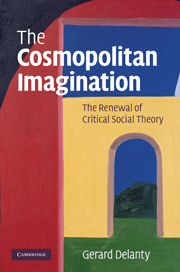Book contents
- Frontmatter
- Contents
- Preface and acknowledgements
- Introduction
- 1 The rise and decline of classical cosmopolitanism
- 2 Contemporary cosmopolitanism and social theory
- 3 Global ethics, solidarity and the problem of violence
- 4 Cosmopolitan citizenship and the post-sovereign state
- 5 Multiculturalism from a cosmopolitan perspective
- 6 Religion in a cosmopolitan society
- 7 Cosmopolitanism, modernity and global history
- 8 Cosmopolitanism and European political community
- 9 Europe as a borderland
- 10 Conclusion: inter-cultural dialogue in a post-Western world
- Bibliography
- Index
4 - Cosmopolitan citizenship and the post-sovereign state
Published online by Cambridge University Press: 18 January 2010
- Frontmatter
- Contents
- Preface and acknowledgements
- Introduction
- 1 The rise and decline of classical cosmopolitanism
- 2 Contemporary cosmopolitanism and social theory
- 3 Global ethics, solidarity and the problem of violence
- 4 Cosmopolitan citizenship and the post-sovereign state
- 5 Multiculturalism from a cosmopolitan perspective
- 6 Religion in a cosmopolitan society
- 7 Cosmopolitanism, modernity and global history
- 8 Cosmopolitanism and European political community
- 9 Europe as a borderland
- 10 Conclusion: inter-cultural dialogue in a post-Western world
- Bibliography
- Index
Summary
One of the most notable features of the current day is a shift from peoplehood to personhood. Throughout the world in recent times governments are forced to recognize the integrity of the person, not as an abstract individual as in liberal political theory, but as an embodied being shaped by social struggles. Personhood challenges the hitherto dominant notion of peoplehood that has been a feature of the era in which the modern national state determined the nature of political community. Peoplehood has mostly been defined in terms of nationhood, for the national community has been for the greater part the community of the national state. Current developments, which can be linked to the local–global nexus, suggest a reshaping of peoplehood along with political community more generally in the direction of personhood. This has been reflected in the growing importance of cosmopolitan politics: international law, the rights of minorities, global solidarities and global justice, and cultural rights of various kinds. What is implied by the turn to personhood is a conception of political community that avoids both communitarianism and individualism and which can be termed cosmopolitan. Cosmopolitanism indicates a transformative conception of belonging whereby the citizen is neither a passive entity nor a pre-political being but an active agent.
In the previous chapters a case was made for a view of cosmopolitanism as real, as opposed to an abstract ideal, and as such rooted in the practices of contemporary politics as well as socio-cultural processes.
- Type
- Chapter
- Information
- The Cosmopolitan ImaginationThe Renewal of Critical Social Theory, pp. 111 - 131Publisher: Cambridge University PressPrint publication year: 2009

